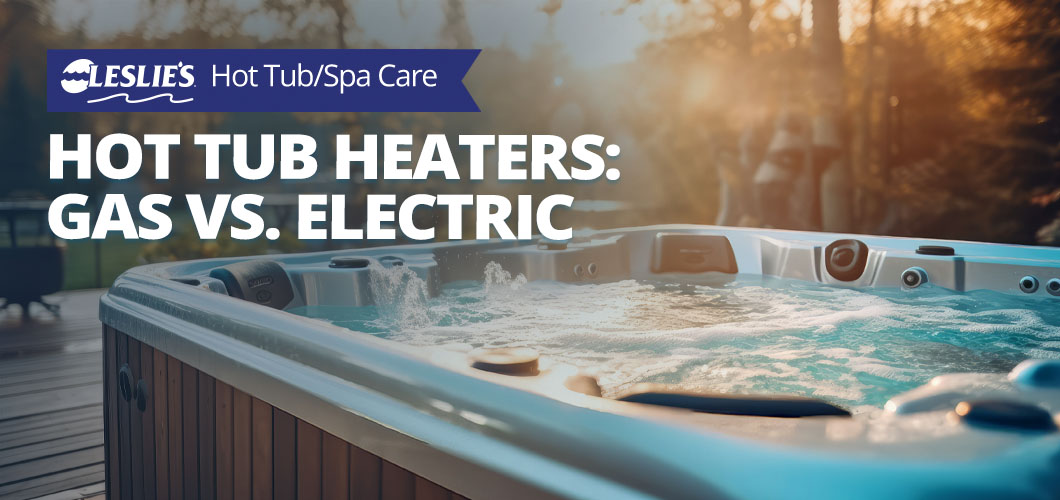
Hot Tub Heaters: Gas vs. Electric
In the old days, all hot tub heaters were gas-fired heaters. Or small pool heaters, specifically. Most hot tubs were not kept hot all the time, and they were not covered with a thick, insulated cover or spa top. Instead, they were heated up on demand. Nowadays, most spas and hot tubs are heated with an electric heating element tucked into a stainless steel tube. But the question is, which type of hot tub heater is best — gas or electric?
Gas Hot Tub Heaters

Gas spa heaters, such as the Pentair MasterTemp or the Raypak 106A, are powered by either propane or natural gas. They can be used for inground spas, free-standing wooden hot tubs, or even for portable spas if installed outside of the spa cabinet. A gas line is connected to the heater by a gas contractor to provide a constant supply of fuel, which is ignited by spark ignition.
Gas Heater Pros:
- Low Operation Cost: Natural gas has become less expensive in recent years. Propane gas is more costly, but produces slightly more BTU's than natural gas.
- Fast Heating: Gas heaters are the clear winners when it comes to the speed of heating. A gas spa heater can add 1-2° per minute, whereas an electric heater may take an hour to add a few degrees. This lets you keep the spa at a lower resting temp, and heat it up quickly as needed.
- Overcomes Obstacles: For large spas over 700 gallons, or for poorly insulated spas or wooden hot tubs that are used year-round in freezing climates, electric spa heaters can cost a small fortune to operate when compared to gas heat.
Gas Heater Cons:
- Higher Initial Cost: A gas spa heater costs about $1,000 alone. In addition, it needs to have a gas line connected to the natural gas meter (or the propane tank). Costs for a buried gas line vary based on the distance of the meter to the heater, and this added cost can sometimes exceed the price of the heater itself.
- They're Gas: Accidents with gas spa heaters rarely ever happen, but it is a possibility. If you're concerned about the safety of gas appliances, you should consider the associated risks, which include gas leaks and carbon monoxide exhaust.
- External Installation: Not that they are ugly, but you can't exactly tuck a gas heater underneath a portable spa. It needs to sit outside in the open air, with access to fresh air and clear sky above for the exhaust.
Electric Hot Tub Heaters

Electric hot tub heaters are sometimes called flow-thru heaters, which are basically a long electric heating element inside of a stainless steel tube. Union connectors on the end make it easy to access the element inside the slim, compact tube. Attached to the tube are temperature sensors, high limit and pressure switches to monitor temp and water flow.
Electric Heater Pros:
- Low Operation Cost: If your spa is located in a mild climate, is well insulated and has a good spa cover, using electric spa heaters is usually less expensive to operate than gas heaters. That is, of course, unless you live in an area with expensive utilities.
- Low Initial Cost: Electric spa heaters cost much less to purchase than gas heaters - usually in the $100-$300 range. Also, there's no gas line to run. Most spa heaters or spa packs are powered by 240 volts from a 60 amp GFCI circuit breaker.
- Low Repair Costs: Electric spa heaters are simple devices, and repairs usually cost less than $100. Gas heaters are much more complicated by design, and repair expenses are much more costly.
Electric Heater Pros:
- Slow to Heat: The best you can hope for is 2-3° per hour on a small, well insulated spa with a 5.5 or 11 kw element(s). Cold outside temperatures and high winds can reduce heat gain to just 1° per hour on spas with smaller 4 or 5.5 kw elements, and smaller 1.5 kw heaters may not be able to keep up.
- They're Electric: We all know that water and electricity don't mix, but spa heaters are protected by a GFCI and several safety components to prevent overheating and electric shock. However, accidents can still happen with 240 volts.
- Higher Operational Costs: This is always a possibility, depending on circumstances. If your electrical costs are greater than 25¢ per kw, you'll reach a tipping point where it costs more to heat with electric spa heaters than with a gas spa heater. Especially for spas or hot tubs with poor insulation located in cold Northern climates, you will find it more expensive to maintain hot water during winter.
Bottom Line
For most people, myself included, an electric spa heater is simpler and cheaper, both in the short run and the long run. For those who live in much colder regions than Southern California, however, a small gas heater may be a better choice. It may also be a smarter investment for low use spas, which can be maintained at 85°, and cranked up to 104° in just a half hour.
Cost Comparison:
If you want to figure out the cost comparison between gas and electric, it takes 8.34 BTUs to raise one gallon of water one degree Fahrenheit. Assume that heat loss is constant in both cases (although it does increase during colder months), and know that gas heaters are only 80% efficient, while electric heaters are nearly 100% efficient. Then you can compare your cost of gas (in therms) and electricity (in Kilowatts) to produce your own analysis.
There doesn't seem to be a clear winner in this contest! In the end, it really comes down to what will work best for you and your hot tub or spa. Both types have their fair share of pros and cons when it comes to purchase price, operating costs, installation and frequency of use.